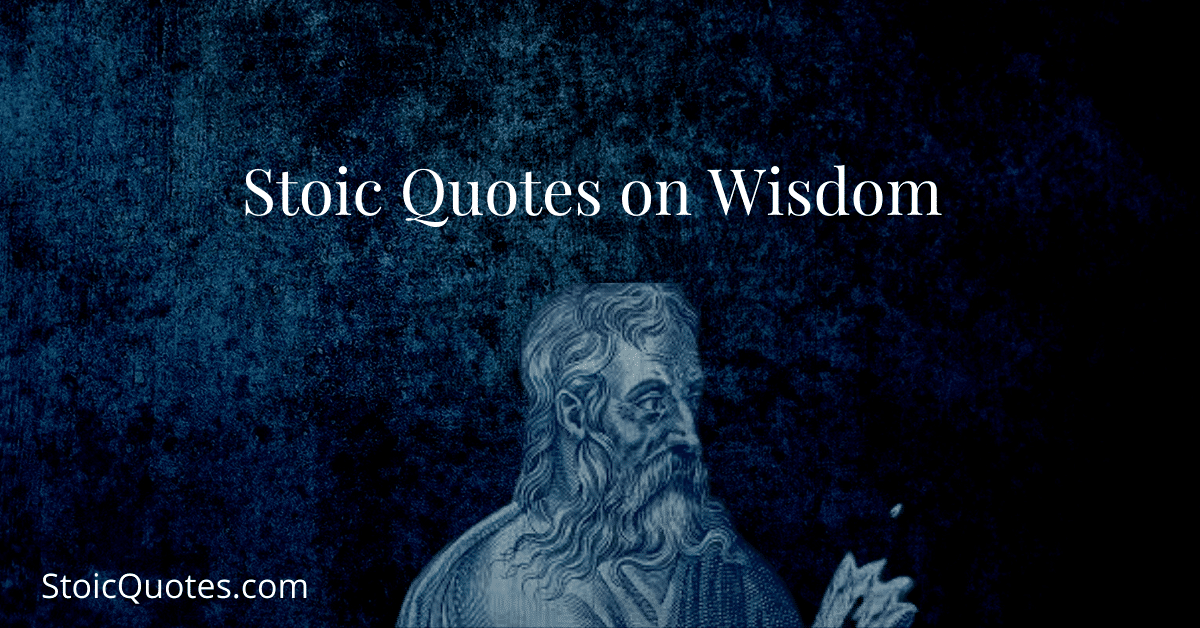
The ancient Stoics used four primary virtues to guide their actions: courage, justice, temperance, and wisdom. Of these four, wisdom is arguably the most important because it allows you to know how best to apply the other three. In the following Stoic quotes on wisdom, we’ll explore exactly what it means to be wise.
To the Stoics, wisdom is the ability to discern the difference between what is good, what isn’t good, and what is neither. This is an essential tool in living a virtuous life, in their eyes, as it allows you to act deliberately. Otherwise, how can you know what the highest good is and how to achieve it?
If you're looking to begin (or continue) the slow walk towards becoming wise, the ancient Stoics are wonderful people to consult with.
Let's dive in and take a look at what our favorite Stoics and some other Stoic-minded thinkers believed about the nature of wisdom.
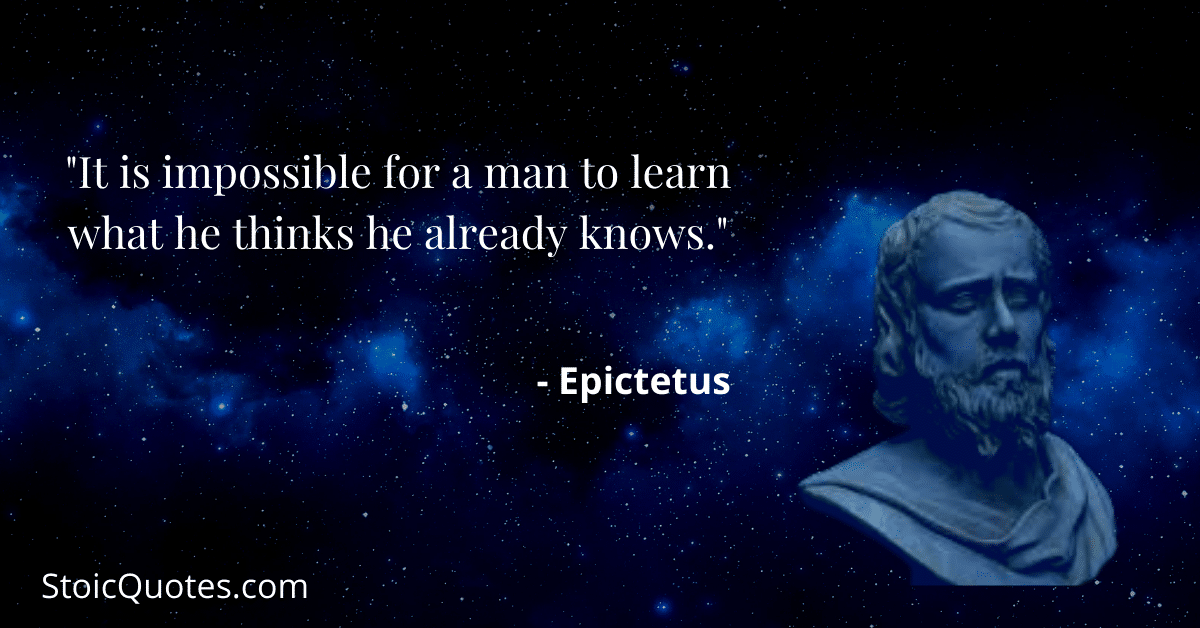
Epictetus is one of the great Stoic philosophers whose work influenced great minds like that of Marcus Aurelius (who we'll hear from a little later on the topic of wisdom.)
Born into slavery, Epictetus obtained his freedom only to be banished from Rome by the emperor Domitian. Known for having lived his life with very few possessions, Epictetus believed wholeheartedly that Stoicism wasn't just a bunch of abstract ideas, but a philosophy that could be directly applied to life.
Despite all the difficulties he had in his life, Epictetus maintained a truly impressive mindset. He did not seem to see himself as a victim of slavery or banishment, but instead developed incredibly insightful ideas about what you can control in life, what you can't, and how to tell the difference.
There's a lot of wisdom to be found in the words of Epictetus, some of which we'll explore here.
"It is impossible for a man to learn what he thinks he already knows." – Epictetus
Sometimes the words "wise" and "smart" get used interchangeably, but they really aren't the same thing. Here, Epictetus shares the truth that in order to be open to learning more, you always have to be willing to doubt that which you believe you already know.

“He is a wise man who does not grieve for the things which he has not, but rejoices for those which he has." – Epictetus
Getting an advanced degree from a prestigious university does not inherently make you wise. In this quote, Epictetus gives us an example of what it might look like to be wise. Connected with one's actual reality and present in the moment, the wise man can appreciate what he has rather than being discontented because of what he lacks.
“It is the nature of the wise to resist pleasures, but the foolish to be a slave to them.” – Epictetus
You've probably known people who were a slave to pleasures-- whether it be material objects, drugs, sex, food, affirmation, or another vice. To Epictetus, the wise have control over their mind and their actions.
"He who exercises wisdom exercises the knowledge which is about God." – Epictetus
Beautiful. Knowledge is good, but there is something deeper, and, in the words of Epictetus, Godly about wisdom.
"The world turns aside to let any man pass who knows where he is going." – Epictetus
When you possess wisdom, you have direction. There is a funny thing about life where the universe really will start to unfold for you when you find a purpose and walk toward it.
"Difficulty shows what men are. Therefore when a difficulty falls upon you, remember that God, like a trainer of wrestlers, has matched you with a rough young man. Why? So that you may become an Olympic conqueror; but it is not accomplished without sweat." – Epictetus
According to many of the greatest minds of history, wisdom isn't really possible without struggle. To practice being wise in the face of difficult events, you can try to remember that God (or the universe, or nature, or fate, or whatever you'd like to call it) has put this obstacle in your way just so you can overcome it and become stronger. To be able to face hard times with such a mentality would certainly classify as wise in the eyes of the Stoics.
"These are the signs of a wise man: to reprove nobody, to praise nobody, to blame nobody, nor even to speak of himself or his own merits." – Epictetus
It's quotes like these that makes one wonder-- are there any wise people left in the 21st century? If you happen to come across someone like this, consider whether you've run into a rare breed indeed.
Are you looking for more wisdom from the great philosopher Epictetus? Check out some of Epictetus' best quotes here.
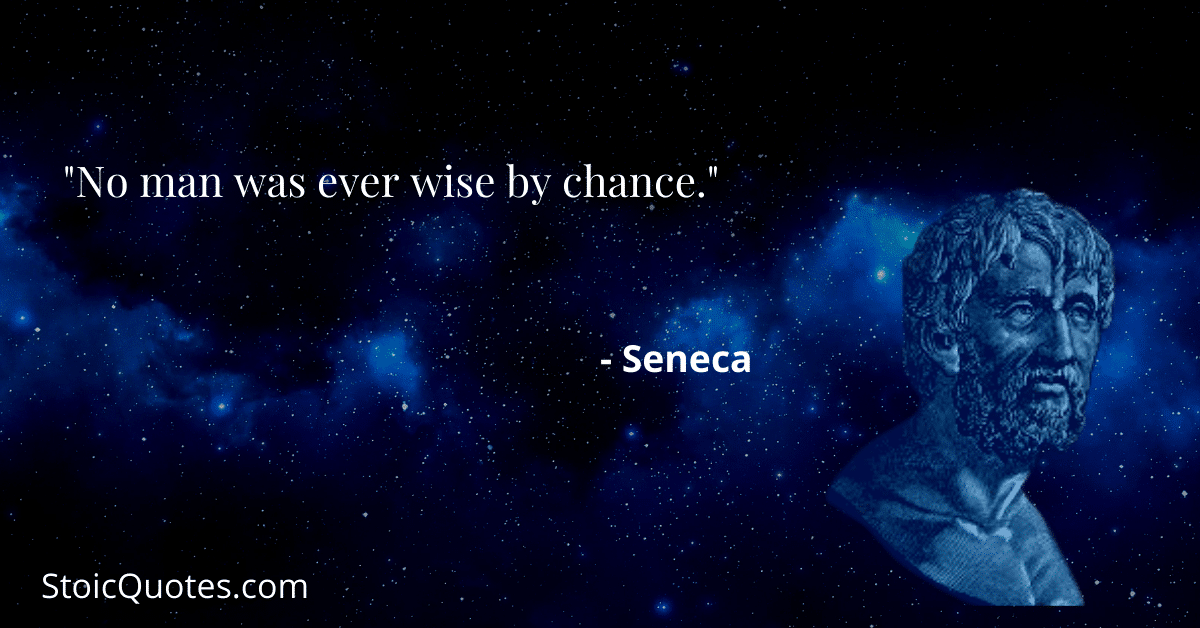
Seneca the Younger has quite a bit to say on the topic of wisdom, some of which you might feel inclined to incorporate into your day-to-day life.
"No man was ever wise by chance." – Seneca
Short and sweet, this quote is a great antidote to some of the nasty assumptions of our culture. We all seem to hope that we are secretly some kind of savant, that we have an inborn talent that will show itself and provide us a life of wealth and fame. Perhaps we even think that we can repeat affirmations and listen to inspirational audio recordings when we sleep. Maybe we're constantly searching for that get-rich-quick scheme that will let us retire early and never work again.
Seneca is right, though. We don't get wise by accident, and we usually aren't successful by accident, either. Achieving greatness in life and as a person takes deliberate and careful effort-- period.
“Now I will explain how you can recognize that you are not wise. The wise man is full of joy, cheerful and calm, undisturbed. He lives on equal terms with the gods. Now examine yourself: if you are never sad, if no hope disturbs your mind with anticipation of the future, if by day and night the condition of your spirit is even and unvarying, alert and happy with itself, then you have reached the high point of human good.” – Seneca
What does it mean to be wise? Seneca gives you instructions on exactly how to know whether or not you qualify.
“Don’t stumble over something behind you.” – Seneca
How much time do we spend thinking about the past, stressing about it, fretting about it? Unless you're very wise, probably quite a bit.
“What’s the good of dragging up sufferings which are over, of being unhappy now just because you were then.” – Seneca
Here's exactly why you shouldn't stumble over something behind you.
“A physician is not angry at the intemperance of a mad patient, nor does he take it ill to be railed at by a man in fever. Just so should a wise man treat all mankind, as a physician does his patient, and look upon them only as sick and extravagant.” – Seneca
If you do become wise, what are you supposed to think about everyone else? It's easy to feel frustrated with other people who you feel are missing some essential information about how best to live. But, in doing so, you're not really being wise at all-- to Seneca, the wise look at the unwise as sick and extravagant, rather than being angry at them.
“While we are postponing, life speeds by.” – Seneca
Another essential part of being wise in the Stoic mindset is to stop procrastinating and live your life. Don't put everything off, otherwise, you might die before you get to the good stuff.
“A good mind possesses a kingdom.” – Seneca
To be wise is, unfortunately, not just a list of cliché quotes that you draw from when faced with a situation or fashioning an outward persona of wisdom. A great mind is, instead, a world in its own right.
“If one does not know to which port one is sailing, no wind is favorable.” – Seneca
Reminiscent of one of our Epictetus quotes listed above, this Seneca quote points towards the necessity of having purpose and direction in life.
“If wisdom were offered me with this restriction, that I should keep it close and not communicate it, I would refuse the gift.” – Seneca
Is it worth having wisdom if you aren't allowed to share it? Seneca says no.
“The mind unlearns with difficult what is has long learned.” – Seneca
Be wary of the things you're certain about. They're the hardest to overcome if it turns out that you're wrong.
“Wisdom does not show itself so much in precept as in life - in firmness of mind and a mastery of appetite. It teaches us to do as well as to talk; and to make our words and actions all of a color.” – Seneca
Wisdom is the tool you can use to create a consistently virtuous life in your thoughts, speech, and actions.
“He who seeks wisdom is a wise man; he who thinks he has found it is mad.” – Seneca
It might just be true-- to be wise is to always be searching for wisdom with the knowledge that you will never reach your destination.
“There is nothing the wise man does reluctantly.” – Seneca
Do you drag your feet through life? According to Seneca, you've got some work to do if you want to be wise.
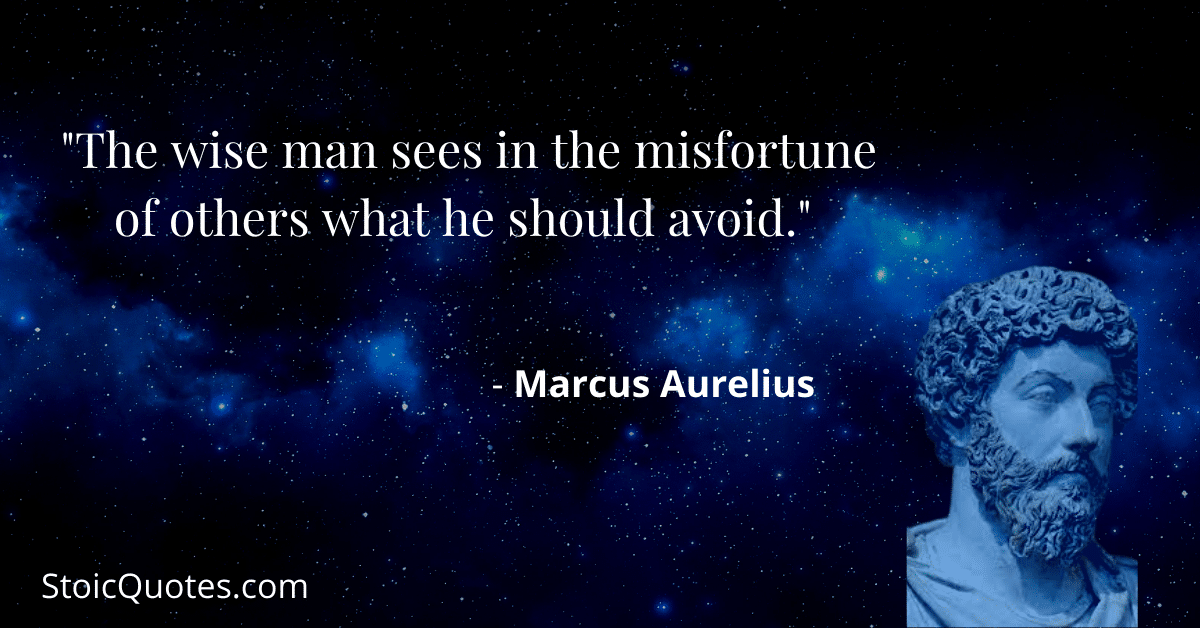
Often considered the wisest Roman emperor, it seems only right that we would check in with Marcus Aurelius' thoughts on the topic of wisdom. If you ever feel inspired to seek wisdom from the pages of history, his Meditations is a great place to begin.
"The wise man sees in the misfortune of others what he should avoid." – Marcus Aurelius
When you see other people struggling, what do you think? We're all probably guilty of schadenfreude at some point in life, but, according to Marcus Aurelius, the wise response is to realize that the suffering person could be you.
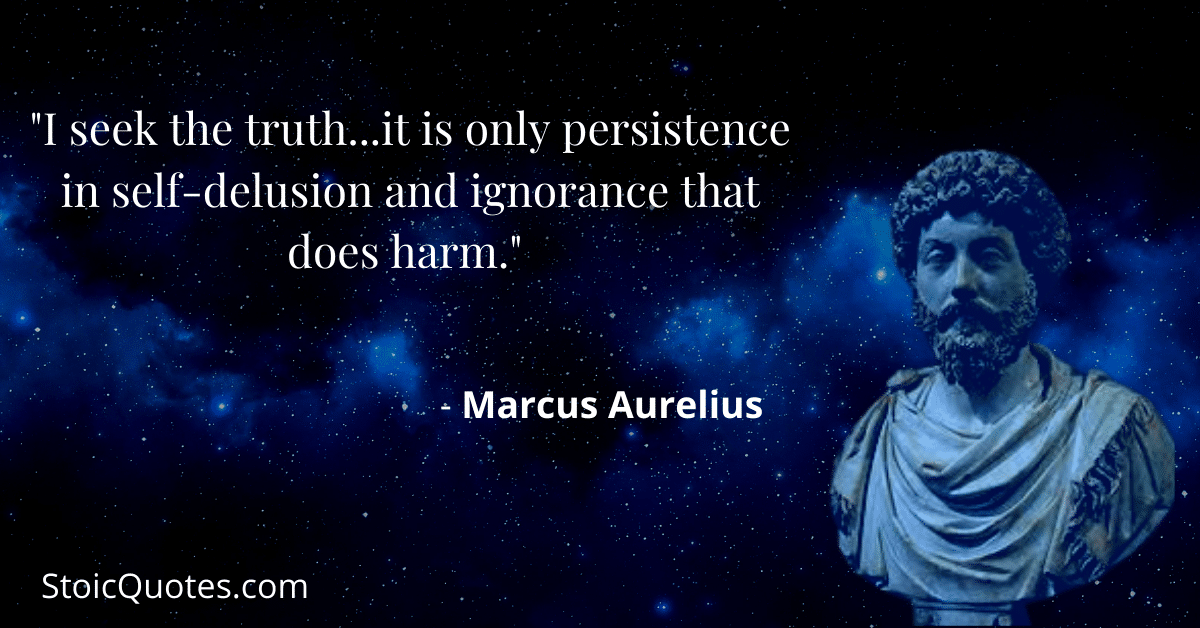
“I seek the truth...it is only persistence in self-delusion and ignorance that does harm." – Marcus Aurelius
How many very intelligent people keep themselves from being wise because they don't like the truth that's right in front of their face? If you ask me, way, way too many.
Though we don't have a ton of Cleanthes' writings to learn from, we are fortunate to have had a few fragments of his work survive to modern times. Let's check out what he thinks about wisdom.
“Ignorant men differ from beasts only in their figure.” – Cleanthes
Harsh but true, Cleanthes lets us know exactly where he thinks ignorant men lie on the evolutionary ladder.
“The Fates guide the person who accepts them and hinder the person who resists them.” – Cleanthes
Again, we are confronted with the idea that the person who knows where he's going and trusts fate enjoys a lovely float down the river. When you don't know where you're going and don't have faith, the whole thing is more of a struggle.
What does Zeno of Citium, the founder of the Stoic school of philosophy have to say on the topic of wisdom?
“The reason why we have two ears and only one mouth is that we may listen the more and talk the less.” – Zeno of Citium
This is perhaps the most actionable advice given in our Stoic quotes so far about how to become wise.
“Better to trip with the feet than with the tongue.” – Zeno of Citium
What we say matters. A fascinating exercise is practicing being very deliberate in your speech and listening to yourself when you do talk. Over time, you can learn to trip with your tongue a lot less often.
“That which exercises reason is more excellent than that which does not exercise reason; there is nothing more excellent than the universe, therefore the universe exercises reason.” – Zeno of Citium
We haven't talked much about reason in relation to being wise so far, but Zeno is definitely a fan.
Of course, many other thinkers throughout history have been influenced by the Stoics directly or indirectly. Beyond that, many great minds have tapped into the same wealth of knowledge and truth that the ancient Stoics seemed to have access to.
“The invariable mark of wisdom is to see the miraculous in the common.” – Ralph Waldo Emerson
It's easy to spend our days dreaming of better places, better people, and better experiences. To Emerson, and, I'd argue, to the Stoics, wisdom is being able to really tap into how incredible our present experience is.
“The years teach much which the days never know.” – Ralph Waldo Emerson
Wisdom isn't something you just wake up with one morning. At the same time, you have to be deliberate in your thoughts and actions each day to eventually get anywhere close. Ultimately, we can expect or at least hope that some light will be shed on our experiences years down the line that we simply couldn't see at the time.
“Is it so bad, then, to be misunderstood? Pythagoras was misunderstood, and Socrates, and Jesus, and Luther, and Copernicus, and Galileo, and Newton, and every pure and wise spirit that ever took flesh. To be great is to be misunderstood.” – Ralph Waldo Emerson
We have a cultural obsession with being accepted by others, and it's definitely not good for our overall ratio of wise-to-unwise. Perhaps one of the hallmarks of being wise is having the strength to persevere in what you believe is true and right, despite the consequences brought upon by fearful and ignorant people.
“Knowledge is the antidote to fear.” – Ralph Waldo Emerson
We talked about wisdom not being the same as knowledge, and that's true. However, this wise statement was worth including because anxiety is so terribly common these days. If you are afraid of something, learn more about it. You'll feel better, I promise.
Are you looking for some Stoic advice when it comes to anxiety and worry? Check out this article on Stoicism and anxiety.
“To finish the moment, to find the journey’s end in every step of the road, to live the greatest number of good hours, is wisdom.” – Ralph Waldo Emerson
Beautiful. I have a feeling if you could share this with Marcus Aurelius, he would approve.
“Not until we are lost do we begin to understand ourselves.” – Henry David Thoreau
Just like you can't learn something if you're certain you already know it, you can't understand yourself until you've gotten lost.
“To be a philosopher is not merely to have subtle thoughts, nor even to found a school, but so to love wisdom as to live according to its dictates, a life of simplicity, independence, magnanimity and trust.” – Henry David Thoreau
Thoreau seems to be of the same mind as the Stoics-- philosophy is to be used in everyday life and incorporated into one's self, rather than something that's simply fun to talk about at parties.
“It is a characteristic of wisdom to not do desperate things.” – Henry David Thoreau
I think I might just hang this one on my wall so I can stare at it before I start every single day. How often do you act out of desperation, out of a sense of emergency? Consider the wisdom you could find in pinpointing these acts.
“A grain of gold will gild a great surface, but not so much as a grain of wisdom.” – Henry David Thoreau
The Stoics were not lovers of material wealth and have a lot to say about what it really means to be wealthy. Thoreau is very much on the same page.
“Honesty is the first chapter in the book of wisdom.” – Thomas Jefferson
Being smart is easy enough, but how easy is it to be honest? Telling the truth takes true courage and faith, and, according to Jefferson, is a path to wisdom.
“ He who knows nothing is closer to the truth than he whose mind is filled with falsehoods and errors.” – Thomas Jefferson
So true.
“The wise know too well their weakness to assume infallibility; and he who knows most knows best how little he knows.” – Thomas Jefferson
Do you know why Socrates was said to be the wisest man in the world? It's because he asserted that he knew that he knew nothing.
“The doorstep to the temple of wisdom is a knowledge of our own ignorance.” – Benjamin Franklin
Why does it seem like the truest statements are always paradoxes? According to Ben Franklin, an arguably wise man himself, we need to know how ignorant we are before we can become wise.
“Remember not only to say the right thing in the right place, but far more difficult still, to leave unsaid the wrong thing at the tempting moment.” – Benjamin Franklin
Are you wise enough to keep your mouth shut when you're all geared up to say something that doesn't help you or anyone else?
"A house is not a home unless it contains food and fire for the mind as well as the body.” – Benjamin Franklin
Life isn't just about the material, and our needs aren't just physical. After all, man doesn't live on bread alone.
“Without freedom of thought there can be no such thing as wisdom; and no such thing as public liberty, without freedom of speech.” – Benjamin Franklin
How many of us keep ourselves from having profound revelations because we are bounded in our thinking? In order to be wise, you have to be willing to entertain thoughts you might not agree with.
“A person who thinks all the time has nothing to think about except thoughts. So he loses touch with Reality, and lives in a world of illusion.” – Alan Watts
Being wise isn't just about what you're thinking about. In fact, like Alan Watts says, only thinking will leave you totally out of touch and delusional. Being wise is about what you do, too.
“We should not pretend to understand the world only by the intellect. The judgement of the intellect is only part of the truth.” – Carl Jung
That's right-- being wise isn't the same as being intellectual. According to Jung, and I'm inclined to agree, the intellect is only a part of the equation.
“Where wisdom reigns, there is no conflict between thinking and feeling.” – Carl Jung
Here we see what Jung means by "the judgment of the intellect" being "only part of the truth." Feeling is a part of it too-- wisdom is not just about the reasoning mind but also felt experience.
“There is more wisdom in your body than in your deepest philosophy.” – Friedrich Nietzsche
Nietzsche also touches upon the idea that wisdom isn't just about the books your read or the thoughts you have.
“Wisdom sets limits even to knowledge.” – Friedrich Nietzche
To be wise is to realize that there are things you don't know and perhaps that you won't ever be able to know.
“Yesterday I was clever, so I wanted to change the world. Today I am wise, so I am changing myself.” – Rumi
As we grow and learn about the world, it's easy to start seeing how things could be better, and how things could be different. The temptation is to share our "wisdom" and tell everyone else how they should change. However, perhaps real wisdom is understanding that we can only reliably change ourselves.
How do we know if we are wise? Unfortunately, it seems that if you think you're wise, you're missing the mark. Wisdom seems to be an elusive thing, something that is only apparent when it is present but must deny itself in order to be real. A wise man, to some extent, must be painfully aware of his own limitations. Like Socrates, he must know that he does not know.
In your quest for wisdom, Stoicism is a great place to look. If you're searching for more quotes and information about the best Stoic minds of history, be sure to check out the rest of the website.
We encourage you to share this article on Twitter and Facebook. Just click those two links - you'll see why.
It's important to share the news to spread the truth. Most people won't.